Text
media: the very serious brooding asshole character is actually super deep and complex
me: ok
media: the dumb joke character is actually super deep and complex
me: ghhogoohhh. ohhhh oh mygod. oh m. oh. are you kidding me. oh i am going to throw the fuck up over this
8K notes
·
View notes
Text



Mémoire 13—→Mémoire 63
Dante's in with the house of de Sade.
62 notes
·
View notes
Text
I've been doing a lot of reading lately about the history of vampires in fiction and how the vampire as we know it today first entered literature, and the subject is honestly fascinating. The traditional folklore around vampires and vampire-like creatures is largely very different from what we'd think of as a vampire today, and it's also very different from how vampires appeared in even their earliest literary incarnations.
For one thing, there's nothing particularly alluring about most traditional vampires. They're bloated corpses that have crawled out of their graves, not dashing mysterious counts in lonely castles. They're not a particularly stylish or sexy monster.
However, from pretty much the moment that western literature first turned to the vampire myth for inspiration, writers saw something in the concept to sexualize. The poem "Der Vampir" (The Vampire) by Heinrich August Ossenfelder is often cited as the first ever true literary depiction of a vampire (published 1748!), and it is about a man corrupting a chaste and religious woman through his unwanted kiss/vampiric bite. John William Polidori's 1819 short story "The Vampyre" is widely seen as the first work to truly codify vampire fiction, and the titular Vampyre Ruthven is in large part inspired by the womanizing Lord Byron. Le Fanu's Carmilla depicts an intense attraction between Carmilla and her victim Laura. Stoker's Count Dracula is a man with overly flushed lips and hair on his palms, marks of Victorian fears of sexuality.
From the very start, vampires in literature have been a sexual monster. They're emblems of the seductive and terrible—the kiss of death that you can't help but be drawn to anyway. A violent forced intimacy that will corrupt you and drain away your very life force. There's a great deal of xenophobia and fear of the un-christian in early vampire fiction as well, but the fear of sex and sexual assault have always been a driver of literary vampires' horror and allure. Writers seem eternally split between desire for the vampire and revulsion at that very lust, even from the moments that the creatures first graced the page.
There's a great tradition of vampiric fiction both using vampirism to evoke sexual predators and making vampires themselves desirably sexy. Thus, given that it is very concerned with sexual assault and bodily autonomy as themes, often uses predation by a vampire to evoke sexual violence, and is deeply horny about vampires and blood drinking, Jun Mochizuki's The Case Study of Vanitas is actually one of if not the best modern successor to the canon of early vampire literature. In this essay, I will
444 notes
·
View notes
Text
Fun reminder that Vanitas was leading the dance between him and Noé despite being shorter (hand on the waist), which is usually a deliberate subversion. Him both metaphorically and literally guiding Noé works on every thematic level.
Yes this whole string of thoughts has just been me going through the manga again.
94 notes
·
View notes
Text
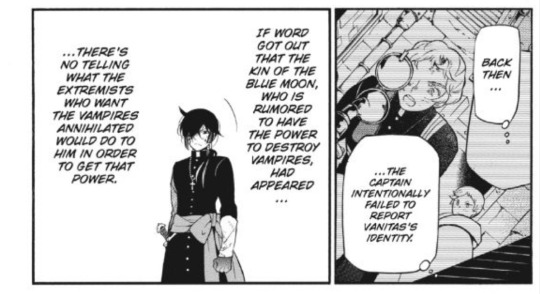
Reminder that this scene happened, courtesy of Maria
33 notes
·
View notes
Text
Is anyone else wondering what Noé was up to before he got the mission to track down the book???
22 notes
·
View notes
Text
TERRIBLE HORRIBLE UNSPEAKABLY BAD TAKE
one of my main theories is that Louis is Vanitas's real name. It would explain the flinch when Mikhail told Vanitas that Louis was Noé's friend and curse-bearer. Plus, it's a super common boy's name. Also the potential tragedy of it all.
124 notes
·
View notes
Text
When you really think about it, Noé is not a free character:
-he’s bound to his archiviste powers
-he was kidnapped and sold having to call his owners “master”
-he’s basically Teacher’s pet
-he’s under Ruthven’s oath control now
-he’s bound to promises made to Vani and Louis
-Misha and JJ both force Noé to drink their blood
-Being sheltered gave Noé a limited scope on society and prejudice
All of these things were out of his control so he doesn’t dwell on them. There’s a moment I feel ppl don’t talk about in ch. 57. JJ apologizes for forcing Noé to see his memories and Noé absolutely brush it off. Everyone else is like….no you can be upset. You’re allowed to be bothered. Noé is so used to not having a choice, of thing being black or white that he genuinely doesn’t see the issue.

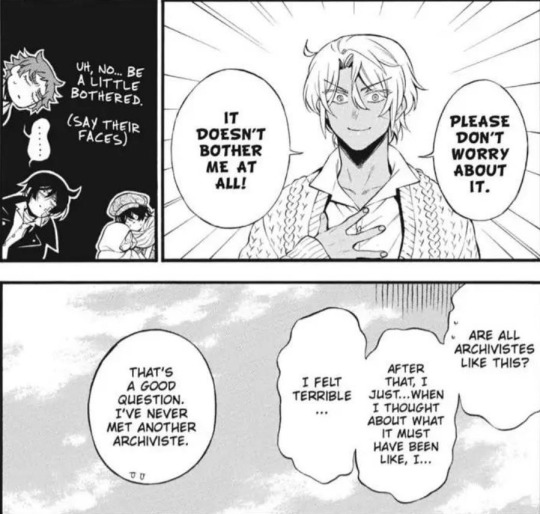
This is one of the many reasons I love the time loop/dream loop, because it’ll be the end result of all of this. After being restricted physically and metaphorically for so long, he creates his own cage.
The tragedy of Noé it will never get old.
77 notes
·
View notes
Text
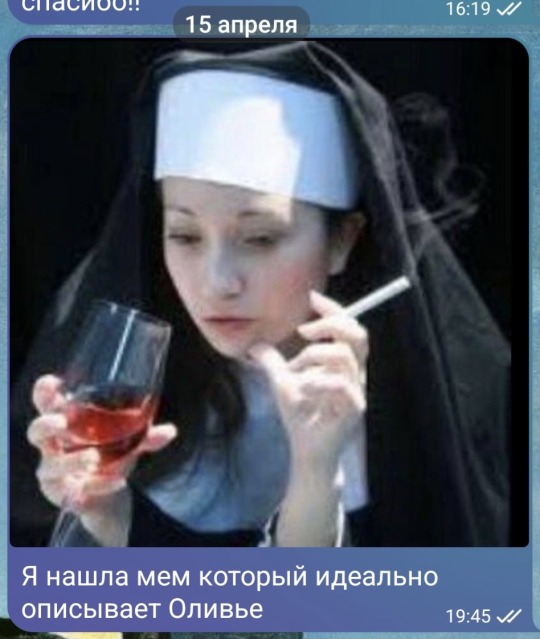
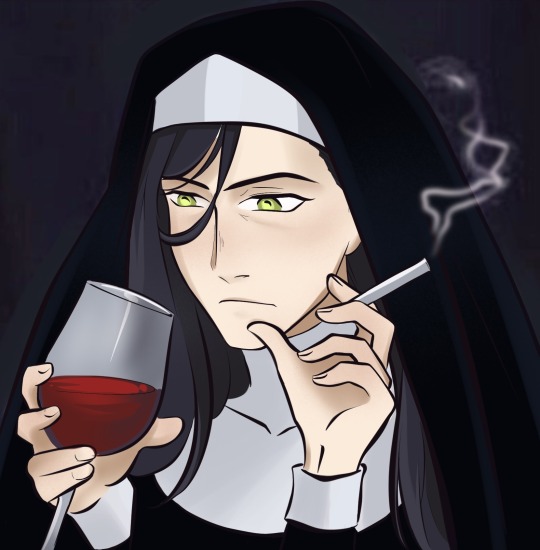
On April 15 I’ve sent my friend this meme as a perfect description of Olivier. Yesterday I found vol 11 omake with Sister Olivier, and then my hand just slipped

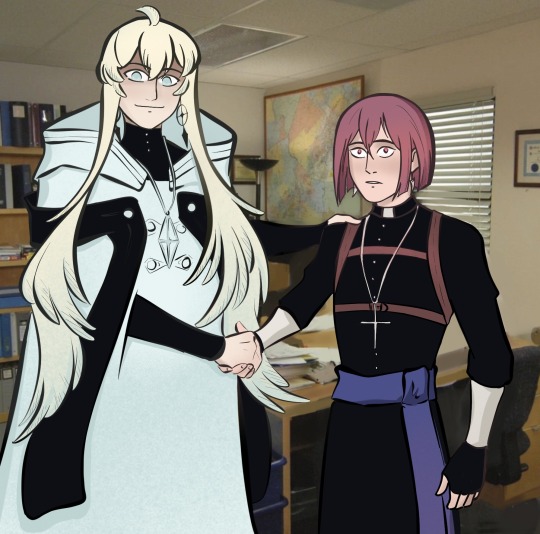
Also now I have some Chasseurs memes (and, apparently, a gift of prophecy) (also the first time I draw Charles is for office meme)
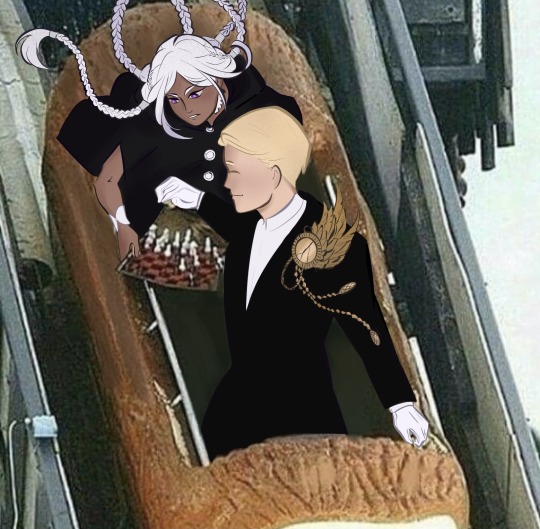
Bonus inspired by second omake: Machina and Teacher being Machina and Teacher
234 notes
·
View notes
Text
DO NOT PLANT THE IDEA OF THIS ASSHOLE BEING DANTE’S FAMILY IN MY HEAD 💀
VnC 63
DOMI MY BELOVED 💜💜💜 She RAN after the dhams after she realized what Noé said was true. She's out of breath and right on time, showered with rose petals. *squeals* On another note, HOW DARE THEY beat Dante up. I have an intense soft spot for him and UGH 😡
Johann is definitely mixed up with the chasseurs. Even the way he stretched his arm was more to stop Dante than to cover him. And if Johann is THIS powerless and willing to let Dante be beaten up rather than to fight... just how huge are the bad news otherwise.
I'm amazed with MochiJun's skill. When Dante heard they may be tortured, the dread was palpable. I could feel all of it, it was deadly and serious. It's incredible how MochiJun managed to get this across with just a panel or two.
Also, with all the notes about the way Noé was supposed to look at first and one of his first names being Johan made me realize that MochiJun seemed to pour the design she couldn't use for Noé into Johann 😁 the glasses, the stern look and strict clothes, remotely similar hair and I think he likes love gossip?..
Also I might be delulu (and most likely am) but I didn't get what this panel meant. Why did he pause and then looked a bit wistful even? Then I thought this guy and Dante have some similar features (the hair shape, the eyebrows, the nose (?))... they can't be related can they?

16 notes
·
View notes
Text
I remain staunch in my headcannon that the bat’s name is Chou. Little cabbage. Little reference to the hotel. It’s so perfect the little bat’s so perfect




While Domi was the real MVP of Mémoire 63, this valiant little guy also deserves a shout-out for his swift action in alerting her to the dhampirs’ plight!
37 notes
·
View notes
Text
Reblog to let your followers know that despite your current obsession your previous obsessions still exist and are simply lying dormant until they awaken and strike again
32K notes
·
View notes
Text
And don’t forget that Domi’s still in the hot seat for that stunt she pulled last arc. It’s not just any vampiric aristocrat, it’s Dominique De Sade, who was just found destroying a human amusement park and getting close in affairs with the Blue Moon Clan.
Now she’s consorting with dhampirs? Facing off with the chasseurs? Oh she’s becoming an eccentric De Sade alright, but I’m not sure the family can or will cover for her shit anymore.
Obviously I'm very glad that Domi has stepped in to help protect Dante and Johann, and it's great that she's calling Dante by his name. However, I'm vaguely concerned that a member of the de Sade family directly confronting chasseurs (and particularly hateful chasseurs!) could lead to very bad things down the line.
Back at the start of the catacombs arc, Johann pointed out that relations between the church and the vampire establishment are still extremely tense, so it would be prohibitively dangerous for Orlock and his people to get involved in a conflict with them. If you take Johann at his word, it could take as little as one false step to set off the beginnings of another war. And the situation has only gotten worse since the catacombs.
Dominique isn't as politically important as Count Orlock, but she's still a member of a key family of aristocrats. If Gano and Ogier escalate the current situation to violence and Domi has to fight them, there's a chance things could spiral out of control in a big way.
There's also a chance Domi, Dante, and Johann will still be able to calm things down without a fight, of course, but if it does come to blows, I'm afraid an excuse to hurt or be hurt by a vampire aristocrat is the perfect opportunity for Gano. We know the extremists want an opportunity to go to war again, after all. I don't know if Gano shares that desire, since he's working with Ruthven on the side, but he's hateful enough that I sure wouldn't rule it out.
89 notes
·
View notes
Text
it's so important to me that when in this chapter domi comes in help of dante and johann, she calls dante with his name. in the previous chapter it's shown that while she thinks that despising the sole existence of dhams is an "old-fashioned and unattractive way of thinking", noe makes her realize that she isn't completely free from the prejudice. and in this instance she's there to help them out, yes, but she actively starts to do something about the way she treats dhams and calling them by their name, just as they were another vampire or human is an extremely good start (given how almost everyone treats them, dominique is getting that character growth for sure). as soon as i noticed this detail it made me sob it's so little yet so important wahhhhh
55 notes
·
View notes
Text
VNC Chapter 63 spoilers:
DOMI!!!!!!! ❤️🥺❤️❤️❤️❤️❤️❤️
Racism! 💀💀💀💀💀😶🌫️👁️👄👁️
16 notes
·
View notes
Text
I've been thinking lately about Vanitas and Noé's first "what is salvation" fight at the bal masqué and what it means about their individual definitions of the concept, and I've realized something about Vanitas.
Noé's definition of salvation is the obvious one. It feels natural. To save someone is to keep them from dying. But in a way, his understanding of salvation is also almost selfish. Noé's foundational trauma is the constant loss of his loved ones. He is the eternal sole survivor. So of course he wants to keep people alive—he wants to "save" the people he cares about in the way that keeps them by his side this time.
It's not wrong to want that, of course. I don't mean "selfish" as a condemnation. It's just that the definition of salvation that Noé starts the series with is inarguably the one that best serves his own happiness.
And it's the same with Vanitas.
When Vanitas kills the little girl Catherine by restoring her true name, he tells Noé he doesn't know what salvation is. He might be lying there, or he might be telling the truth in that he's never put his definition of salvation into words or acknowledged it on a conscious level. Either way, though, I do think he has a definition of salvation somewhere in his mind, and it's a very personal one.
Vanitas sees salvation as the preservation or restoration of one's true self. You're saved so long as you can preserve your essential self, uncorrupted by outside forces. Even if the price of that selfness is death.
While Noé's foundational trauma that informs his worldview is the loss of his loved ones, one of Vanitas's foundational traumas is the loss of his bodily autonomy. Through Moreau's experiments and Luna's mark/bite, he has been transformed into something no longer fully human, and he hates it. From the moment Luna told him he was dying, he said he wanted to die as himself rather than live as their kin, and he has been denied that opportunity.
Nothing is more important for Vanitas than being able to dictate the destiny of his own body, and malnomen are the ultimate corruption of bodily autonomy and selfness. Altering one's true name warps not only their physical body, but their very being on a metaphysical level. The curse takes everything a vampire is and changes it, and doing that to an unwilling victim is the ultimate horror for Vanitas.
Given that context, of course Vanitas thinks that killing a child to restore her true name counts as saving her. He's restoring her essential self and un-corrupting her body and being, and even if her self is only returned for an instant before she dies, it's preferable to living on as something warped by an outside force.
Vanitas absolutely starts the series with a definition of salvation, and like Noé, it's the one that best serves his own happiness. He wants to be saved. He wants to be returned to his human self, and failing that (since he knows it's impossible), he wants to wipe out all traces of the force that changed him and then die without going any further down the path of inhumanity.
Vanitas might not be able to admit that definition out loud (or even to himself directly), but it's there, and it guides him early in the series as much as Noé's own definition of salvation guides him in turn.
184 notes
·
View notes
Text
all descriptions gender neutral, based on vibes only
11K notes
·
View notes